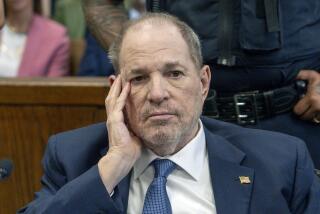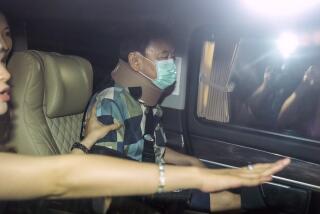S. Africa Moves Mandela to Prison Farm Home
- Share via
JOHANNESBURG, South Africa — The South African government Wednesday night transferred imprisoned black nationalist Nelson R. Mandela from a Cape Town clinic to a “comfortable and properly secured home” on a prison farm in lush wine country about 30 miles away.
Justice Minister Kobie H. Coetsee also lifted all restrictions on family visits for the 70-year-old African National Congress leader, inviting Mandela’s wife and children to live with him in the large ranch-style house, which has a swimming pool, covered patio and sweeping mountain views.
But Mandela’s wife, Winnie, rejected the government’s offer of unlimited access to her husband and vowed to take no longer than the 40-minute visits she has been allowed in the past “until all political prisoners are given the same privilege.”
The transfer marked the first time since 1962 that Mandela has lived outside a prison cell, other than hospital stays.
It was widely viewed as the beginning of a “phased release” for Mandela, an international symbol of black resistance to apartheid who is serving a life sentence for plotting sabotage against the white minority-led government.
By releasing Mandela in stages, political analysts say, the government hopes to demythologize the man millions of black South Africans--most of whom have never seen or heard--consider their natural leader.
Mandela “still remains a prisoner of the South Africa government, and the concession made today to him personally is clearly a response to the domestic and international pressure for his release,” Winnie Mandela said Wednesday night, speaking through the family lawyer, Ismail Ayob.
“South Africa is still under a state of emergency, and there are thousands of political prisoners and detainees, and large numbers of leaders, organizations and the media remain restricted,” she said.
On Prison Grounds
Mandela’s new home is on the grounds of the Victor Verster Prison, a segregated facility for nonwhite inmates located near Paarl, in Cape province nearly 900 miles from his wife’s house in Soweto.
The prison house, apparently reserved for prison officials, resembles those in many of South Africa’s upper-middle-income neighborhoods. Photos of it distributed by the Prisons Service show an L-shaped frame house surrounded by an expansive yard with flower gardens and neatly clipped shrubs, all ringed by a wall.
Over the years, Mandela has steadfastly refused any government deals for his release and instructed his attorney to make no applications for freedom.
President Pieter W. Botha has on several occasions offered to free Mandela, leader of the outlawed African National Congress, if he disavowed violence and agreed not to campaign for violent upheaval in South Africa. Mandela has always turned down those conditions flatly, saying the government must first legalize the ANC, free its political prisoners and end apartheid.
But pressure to release Mandela, from anti-apartheid groups as well as some of the government’s own supporters, has been building since his 70th birthday in July. It grew even more intense when, on Aug. 12, Mandela was hospitalized with tuberculosis, which he contracted in Cape Town’s Pollsmoor Prison.
Since Aug. 31, Mandela has been recuperating under prison guard at a luxury private clinic in a whites-only suburb of Cape Town, about 30 miles from his new home. Two weeks ago, the justice minister announced that Mandela would not be returned to prison. But the minister said Mandela would be moved to a secure house rather than freed because of possible threats to his safety from right-wing white extremists.
The government is known to fear that Mandela’s sudden, unconditional release could touch off widespread violence in South Africa, but it also worries that Mandela’s death in jail would touch off nationwide unrest as well.
His imprisonment has created a hurdle for the government’s attempts to negotiate with moderate black leaders, most of whom have refused to talk with the government until Mandela is freed.
Botha More Conciliatory
Although he continues to say Mandela must renounce violence, Botha has sounded more conciliatory in recent months, suggesting, for example, that humanitarian and health grounds alone might be enough to secure Mandela’s release.
Mandela’s move to a private home is the latest in a series of recent attempts by the government to improve its image abroad and ease international pressure.
The government has given tentative approval to a peace pact that would bring independence for South African-controlled Namibia; spared six blacks known as the Sharpeville Six from the death penalty, and unconditionally freed two other prominent, aging black prisoners--leading ANC member Harry Gwala and Pan-Africanist Congress leader Zephania Mothopeng. But the government has given no indication that it is willing to negotiate with freed black leaders on their demands for one-person, one-vote democracy.
More to Read
Sign up for Essential California
The most important California stories and recommendations in your inbox every morning.
You may occasionally receive promotional content from the Los Angeles Times.














